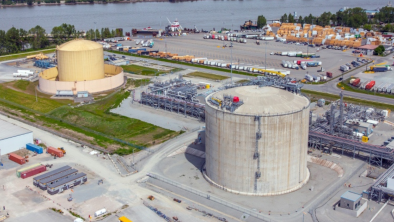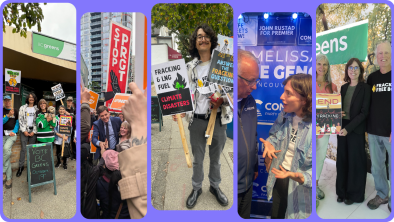B.C.'s new climate targets do little to reduce fossil fuel pollution, critics say
Vancouver Sun

Proposals to reduce greenhouse gas emissions include higher carbon tax, more electric vehicles and making new buildings zero-carbon emitters
A new plan to tackle the climate emergency in B.C. fails to address international calls to ban new fossil fuel development and reduce greenhouse gas emissions from large resource projects, critics say.
The province announced phase 2 of its CleanBC program on Monday, less than a week before the start of a United Nations conference to address climate change in Glasgow, Scotland.
The updated B.C. plan maintains its target to reduce greenhouse gas emissions to 40 per cent of 2007 levels by 2030 and includes a new target of net-zero emissions by 2050. Net zero means that any greenhouse gas emissions in B.C. are balanced by removal of greenhouse gases from the atmosphere.
The government said it will reach the goal, in part, by eliminating methane gas emissions in oil, gas, mining and wood-waste sectors by 2035, reducing oil and gas GHG emissions by 33 per cent by 2030 and setting targets for various sectors for net zero emissions by 2050.
“We need to up our game,” said Premier John Horgan. “British Columbians want to see action.”
Since 2007, the base year used in B.C. because that is when the carbon tax started, greenhouse gas emissions have gone up. In 2018, the last figures before the pandemic disrupted the world economy, B.C. emissions had risen seven per cent above 2007 levels.
But B.C. Green Leader Sonia Furstenau said the plan ignores the most pressing climate emergency — fossil fuel exploration and production.
“The NDP government’s commitment to fossil fuel subsidies are undermining B.C.’s ability to achieve this plan and be a climate leader,” she said. “Between now and 2030, B.C. will see a marked increase in fracking. The government’s support for this industry places a greater burden on the rest of our economy to make up the emissions gap.”
Horgan insisted the LNG plan will not undermine B.C.’s goal to reduce greenhouse gas emissions and said his government is also taking steps to reduce fossil fuel subsidies.
“We have comprehensive sectoral targets for emissions and they’re real. Emissions must come down in all of these sectors, particularly oil and gas,” said Horgan. “We’re just conducting a royalty review. We expect to make significant changes in the new year, going into budget 2022.”
Furstenau said some of the more significant moves, like increasing the carbon tax, eliminating methane gas emissions by 75 per cent and requiring all new vehicles be electric by 2035 are all federal plans that are coming to B.C. anyway. B.C.’s promise to meet or exceed the federal government’s plan to increase the carbon tax to $170 a tonne by 2030 amounts to a three cent a litre increase to the price at the gas pumps every year, starting in 2023.
Another target that requires companies to use cleaner fuels in the production of their products is not welcomed by industry groups like the Canadian Gas Association.
“We are concerned about the degree to which governments are over-relying on electrification as the answer to the challenges of emission reductions,” said Timothy M. Egan, the association’s president and CEO, saying his group “will continue to review the report carefully to see how the gaseous energy system has a future in B.C.”
Other promises, including goals to reduce vehicle use through more public transit and requiring all new buildings to be zero carbon emitters by 2030 are laudable goals, but Peter McCartney, a climate campaigner for the Wilderness Committee, questions why the change for building can’t be put into place immediately.
“New buildings will still be built for the next nine years with fracked gas connections and they could stop that tomorrow,” he said.
McCartney said although targets have been set, the province’s new plan is short on action.
“B.C. has been unable to meet any of its targets set so far because it has not had a plan, and Monday’s announcement does not include any plan to meet the climate emergency that is being driven by fossil fuels,” he said. “This is a plan to make a plan — a goal to be figured out and that should have been sorted in 2018 when CleanBC was first announced.”
Even the co-chair of a government-appointed advisory group agreed Monday’s announcement may be more aspirational than concrete.
“It’s a necessary next step and doesn’t have the answers for everything but it lays out where we need to go,” said Colleen Giroux-Schmidt, vice-president of corporate relations for Innergex Renewable Energy Inc. and co-chair of B.C.’s Climate Solutions Council. “It is realistic in knowing that we still have work to do in finding the solutions.”
B.C. Environment Minister George Heyman said specific policies and budgets for climate action will be in place by next spring. And, he’s promised that increasing costs related to fighting climate change will not overly burden citizens.
“What I can assure British Columbians is that we have not just the rebate system (for the carbon tax) but we have a range of supports, whether it’s in public transportation, whether it’s in zero-emission vehicles, whether it’s in energy-efficient homes that will help you at whatever income level you are, make the changes that we want to see, and those, in turn, will make life more affordable for everyone,” he said.
Read the original article published by the Vancouver Sun here.


